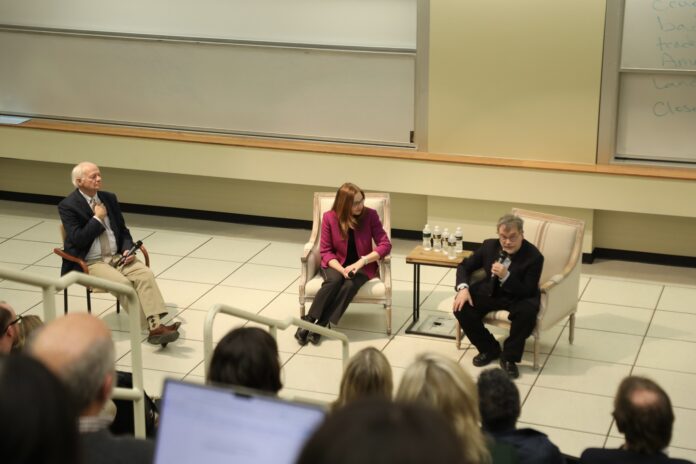
By Luke Lattanzi | Staff Writer
The College of Arts and Sciences hosted a panel titled “Climate Change in the 21st Century” on Monday, featuring two researchers who discussed their thoughts on climate change with a focus on how it exacerbates the spread of infectious diseases.
The panel featured Dr. Peter Hotez, dean of the National School of Tropical Medicine at Baylor College of Medicine, and Dr. Katharine Hayhoe, endowed chair in public policy and public law at Texas Tech University. Dr. Lee Nordt, dean of Baylor’s College of Arts and Sciences, served as the moderator.
Hotez said climate change has worsened the spread of infectious diseases. However, the challenge often lies in figuring out how other factors come into play.
“Is it 20% due to climate change or 40%?” Hotez said. “How do you sort out what’s due to climate change, human migrations, urbanization or deforestation — because they’re all happening together.”
For example, Hotez pointed to poorer neighborhoods in Houston that often have run-down houses that lack window screens, allowing mosquitoes to enter and increasing the risk of diseases like malaria. They also often have discarded vehicle tires, causing small accumulations of water that attract Aedes aegypti mosquitoes — most commonly known for being transmitters of the dengue, zika and yellow fever viruses.
However, Hotez said the problem is a lot bigger than Houston neighborhoods. He said the state of Texas has become a hot spot for these types of infectious diseases. Oftentimes, the challenge is navigating the intense political climate surrounding issues like climate change and immigration.
“In the Gulf Coast in Texas, we’re seeing a rise in mosquito-transmitted virus infections like dengue,” Hotez said. “It’s interesting when I talk about these diseases occurring in Texas like dengue or chikungunya or zika virus infections or chagas disease or typhus. One of the things that they want to blame is they say, ‘Well, we need to build that wall higher because it’s all the immigrants coming up.’”
Hotez said the intense political debates surrounding such topics from both sides of the political spectrum often take away from the severity of the illnesses that are now on the rise.
“It’s very hard for people to accept that level of illness and poverty, and people don’t like to talk about it, so it’s hard to raise awareness for these conditions,” Hotez said.
To raise awareness, Hotez is working with members of the U.S. Congress, specifically Sen. Cory Booker (D-N.J.) and Rep. Hank Johnson (D-Ga.), to introduce legislation that would create a “Center for Excellence” where infectious diseases could be studied more thoroughly.
Throughout the panel, Hayhoe also discussed the significance of rising global temperatures — particularly as a result of the Industrial Revolution, which has been going on for a relatively short period of time when considering the history of human civilization spans roughly 3,000 years.
“According to natural factors, we should be getting cooler right now, not warmer,” Hayhoe said. “Instead, we know that from digging up and burning coal back [since] the 1800s and a lot more oil and gas today, we are producing heat-trapping gases that are building up in the atmosphere, wrapping a blanket of carbon pollution around the Earth.”
Hayhoe said it is important to shift to more environmentally friendly sources of energy to protect infrastructure.
“All of our infrastructure, our buildings, our roads, our highways — they’re all built for a planet that doesn’t exist anymore,” Hayhoe said. “How we grow our food, how we allocate our water, our health systems too — they’re all built for the conditions from 50 years ago, 80 years ago, in some cases, 100 or more years ago.”
Hayhoe said climate change is also affecting the planet’s weather patterns, increasing the frequency of climate disasters like hurricanes and floods. According to the National Centers for Environmental Information, there were about 3.3 billion-dollar climate disasters per year from 1980 to 1989. Comparatively, from 2021 to 2023, there were about 22 billion-dollar climate disasters per year. Hayhoe noted that poorer countries are disproportionately affected by these climate disasters.
“These disasters are coming one after another, and although they affect us all, they don’t affect us equally,” Hayhoe said. “People who don’t have insurance, people who don’t have enough to eat, people who don’t have a home to live in or don’t have the ability to evacuate when a hurricane or a flood strikes — those are the people most affected by the way that a warming planet is supersizing our disasters.”





